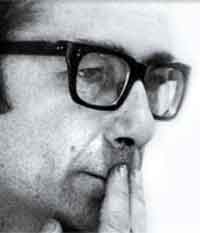|

Rodolfo Walsh
(1927-1977)
(Página 12, 27 October 2005)
|
Walsh,
Rodolfo Jorge
(1927-1977), journalist and novelist, was born in Choele-Choel,
province of Río Negro, the third son
of Miguel Esteban Walsh (1894-1947) and his wife, Dora Gill.
Miguel Esteban Walsh was the second son of Miguel Walsh
(1866-1910) and Catalina Dillon. Rodolfo Walsh's brother
Carlos Walsh was a navy officer, and his sister Patricia was a
Catholic nun.
In
his early age, Rodolfo Walsh was sent to the Irish school in
Capilla del Señor and then to the Fahy Institute in
Moreno. Walsh started his career as a journalist. From
1959 to 1961 he worked for the agency Prensa Latina in
Cuba. Back in Buenos Aires, he wrote for Panorama, La Opinión
and Confirmado. His political activity led him to
the hard-line Montoneros group, where he acted as
intelligence officer. Walsh played a key role in the
bombing of the cafeteria at the police headquarters in 2
July 1976. "On the first anniversary of Jorge Rafael
Videla’s dictatorship, 24 March 1977, he committed the
unforgivable crime of accusing the dictatorship in an open
letter [...] considered by Gabriel García Márquez 'one
of the jewels of universal literature'. But 'the day after
Walsh decried these atrocities', wrote US historian,
Donald C. Hodges, 'three army tanks demolished his home in
the capital’s suburb of San Vicente and disappeared him
as well'. He was murdered in broad daylight in downtown
Buenos Aires by a military death squad whose instructions
were to capture him alive, but had to kill him when he
pulled a gun to return their fire. His dead body was
dumped into the boot of a car, taken to the notorious Navy
Mechanics’ School (ESMA), gloated over, desecrated and
never seen again" (Geraghty 2002).
Rodolfo
Walsh pioneered the investigative journalism in Argentina.
In Operación Masacre, the account of a
summary execution of thirty-four Peronists, Walsh combined
detective suspense with non-fiction narrative techniques.
Among his published works are Diez cuentos policiales (1953),
Cuentos para tahúres, Variaciones en rojo
(1953),
Antología del cuento extraño (1956),
Operación
Masacre (1957), Secuencia Final, the plays La granada
and La batalla (1965), Los oficios terrestres
(1965),
Un kilo de oro (1967), ¿Quién mató
a Rosendo? (1969), Un oscuro día de justicia
(1973), and El caso Satanovsky (1973).
Edmundo Murray
References
-
Coghlan, Eduardo A., Los Irlandeses en Argentina: su
Actuación y Descendencia (Buenos Aires, 1987), p. 884.
-
Delaney, Juan José, Rudy Walsh en Capilla y en Moreno in
"The Southern Cross" (Buenos Aires), 129:5894
(November 2004), p. 16.
- Geraghty, Michael John, Rodolfo
Walsh: An Argentine Irishman in "Buenos Aires
Herald", 29 March 2002.
- McCaughan, Michael, True Crimes: Rodolfo Walsh, the
life and times of a radical intellectual (London:
Latin America Bureau, 2002).
-
Página 12 (Buenos Aires), 27 October 2005.
|


